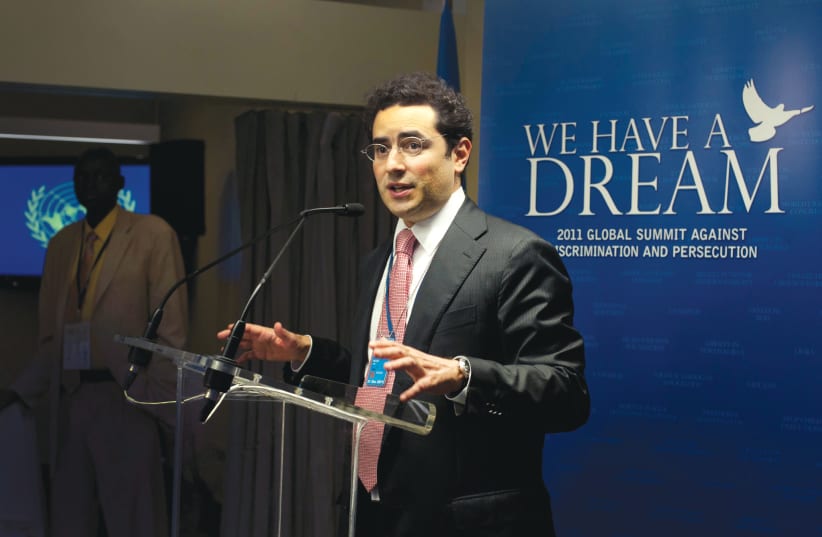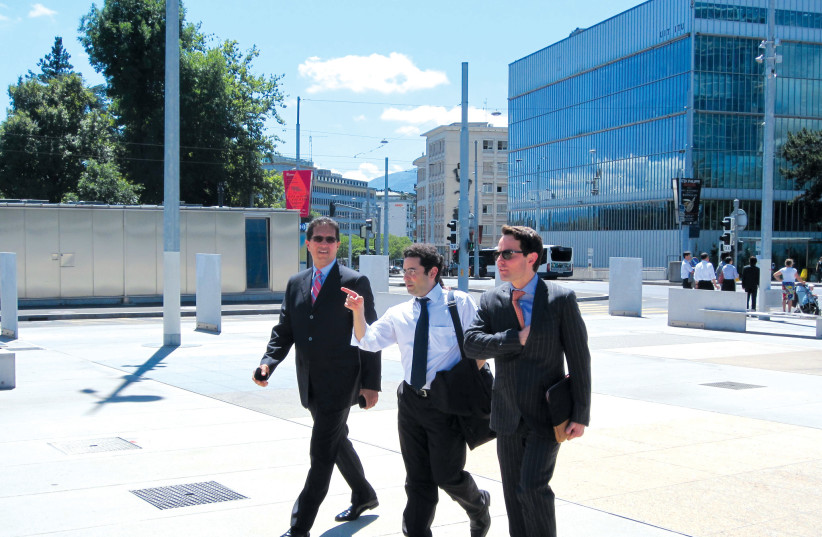Hillel Neuer is used to getting the cold shoulder at the UN Human Rights Council in Geneva.
“When I walk into the room at the UN, if looks could kill I’d be dead by a thousand blows,” he said.
It’s no wonder, because as executive director of the non-governmental organization UN Watch, Neuer points out the myriad ways in which the UN does not live up to the tenets of its own charter. He regularly calls out countries and their leaders on human rights abuses, racism, antisemitism and anti-Israel bias.
Most recently, UN Watch has focused on urging nations to pull out of the Durban IV conference marking the 20th anniversary of the adoption of the Durban Declaration and Programme of Action. It has also exposed more than 100 UN Relief and Works Agency educators’ propagating hate against Jews and promoting terrorism against Israelis, leading to an investigation.
In June, the organization convened online the 13th Geneva Summit for Human Rights and Democracy. Neuer has chaired this annual event (held in person pre-COVID) involving a coalition of 25 human rights groups and providing a platform for pro-democracy dissidents to present their stories and advocate for change.
Neuer, UN Watch’s executive director since 2004, has worked relentlessly at holding up a looking glass to the UN. He wants members to see a distorted, fun-house mirror, as repressive regimes such as Russia and China are elected members of the UNHRC and Israel is scapegoated and condemned in a grossly disproportionate manner.
It’s a tough job, but someone has to do it – and stick at it.
“You sit there and you see these terrible things keep on happening. That can be a bit dispiriting, but that is the nature of the world that we are in. It’s very hard to change these things, but we know we are leading the fight,” Neuer said.
“The odds are so stacked against us. It’s rare that we would ever think we could change things tomorrow, [but] we need to be the leading voice for human rights, democracy, and for fighting against anti-Israeli bigotry so that we set the bar so that countries can follow,” he said.
UN Watch was founded in 1993 by civil rights activist Morris B. Abram, former US Permanent Representative to the United Nations in Geneva. It is an accredited NGO in Special Consultative Status to the UN Economic and Social Council (ECOSOC) and as an Associate NGO to the UN Department of Public Information (DPI). It reports regularly to both.
Before assuming professional leadership of UN Watch, Neuer practiced commercial and civil rights litigation for several years at Paul, Weiss, Rifkind, Wharton & Garrison in New York.
“To some degree, the law firm was a bit of a detour,” Neuer said.
Neuer earned a graduate law degree in comparative constitutional law from the Hebrew University in Jerusalem and clerked for Justice Itzhak Zamir at the Supreme Court of Israel. However, the seed for human rights work was planted earlier when Neuer studied under activist and former Canadian minister of justice Prof. Irwin Cotler at McGill University Faculty of Law.
“In law school I took every course and seminar I could with [Cotler] and became his research assistant. I’ve been close with him for many years. He was a great influence. He’s an extraordinary person...He’s struggled for the rights of Jewish people to fight against antisemitism and anti-Israel bigotry, and for universal human rights – it’s one struggle,” Neuer said.
The UN Watch director was taken by Cotler’s passion for human rights prior to law school, when he would attend rallies to free Soviet Jewry in his hometown of Montreal and hear Cotler speak from the stage.
“The movement spoke in the name of universal values as much as it did in the name of Jewish values. The Jewish values I was taught were about human dignity and respect for everyone. This very much translates to the work we do at UN Watch, which is fighting for the human dignity of everyone, no matter what their race, religion or background,” Neuer said.
Brought up in a Modern Orthodox, Zionist home in the multiethnic Côte-des-Neiges neighborhood of Montreal, Neuer has been based in Geneva for the past 17 years. His work also brings him to Israel fairly regularly.
Yet it is his “Canadian-ness” that Neuer credits for his ability to keep his cool when things don’t go smoothly at the UNHRC.
“I’m patient. At the UN you often get interrupted...I wait for my chance to say something. When you get to say something at the UN, that’s a lot. It may only be 90 seconds, but you want to get your 90 seconds. Patience is a virtue,” he said.
While Neuer may only be given a minute and a half to make his case, he makes sure people far beyond the council chamber hear what he has to say. Thanks to social media, videos of his speeches reach the eyes and ears of millions of followers and supporters worldwide.
The advent of social media has been a boon for UN Watch. Neuer himself now has 129,000 followers on Twitter. It’s not an option for him not to be active on the platform.
“Twitter is the primary political battleground...I’m on Twitter, and so is the spokesperson for the Chinese regime, and so is a CNN presenter. Anyone who has something to say, whether they are a politician or a journalist or some other public figure who is in the battle of words and ideas is on Twitter, so that is why we are there and calling people out,” he explained.
Neuer often uses sarcasm and humor in his tweets. He finds it’s a good way of communicating the absurdity of what is happening at the UN, such as the election of countries like Cuba, Pakistan and Libya to the HRC.
“Whether it’s a tweet or a 90-second speech at the UN. It’s about setting out the facts, having some kind or argument, and doing it in a punchy way,” he said.
UN Watch has many detractors and adversaries, including dictators, and UN officials, who do not like to be held accountable for implementing resolutions that fly in the face of the organization’s founding principles.
“There are also many radical leftists within the NGO sector who despise me, because we dare speak out for Israel’s equal rights. That is not a popular thing; it will earn you a lot of hatred at the UN,” Neuer said.
According to Neuer, it comes down to UN Watch not jumping on the anti-Western bandwagon popular with some other prominent human rights organizations. (He cites Human Rights Watch and Amnesty International among them.)
“I don’t think the US or the West is free from blame... But we don’t think the West is the source of the world’s ills. These other NGOs are a new version of anti-colonialism and borderline Communist ideas about Western exploitation of the rest of the world... We don’t subscribe to this. We think there is a difference between a free democracy and a dictatorship. Switzerland for all its troubles is not the same as Pakistan or Venezuela,” Neuer said.
When it comes to Israel, UN Watch realistically recognizes that there is an automatic majority against the Jewish state for any vote at the UN. If one tallies up the condemnatory resolutions passed by the UN General Assembly, HRC, and the Commission on the Status of Women since 2015, there have been a total of 211 against Israel. By contrast, there have been a mere 16 against Iran, and zero against Saudi Arabia.
“We recognize we are in a context where the numbers are completely hostile to Israel... The immediate objective is not to win the vote, but if you can get a moral majority – Australia, UK, Netherlands, Italy – to vote ‘no’ instead of ‘yes,’ or to abstain, that is noticed by all parties,” Neuer said.
It’s a long slog, but Neuer is certain that UN Watch’s diplomacy and lobbying are paying off and having an effect on decisions made.
Neuer emphasized the importance of UN Watch’s educational efforts, especially in reaching younger audiences who don’t know Middle East history and may assume that the demonization of Israel is justified. While HRC resolutions are not binding they nevertheless can cause serious damage.
“These resolutions are translated into every language and are circulated around the world, affecting the hearts and minds of hundreds of millions of people. They find themselves on bookshelves of foreign ministries and universities, and are used by journalists. So these resolutions matter,” Neuer warned.
The resolutions can also be forwarded on for inquiry by other UN bodies, such as the International Court of Justice in the Hague.
“Now Israelis officers and soldiers don’t know if they are going to be arrested if they get off the plane in London or somewhere else,” Neuer remarked.
UN Watch’s defense of Israel against undue bias, and Neuer’s own related outspokenness in the media, may prevent potential collaborations with other promoters of universal human rights. But Neuer is unapologetic.
“Everyone will look at things in their own way and based on their own perspective, milieu and pressures. Some may be uncomfortable with us. But the reality is that we are who we are,” Neuer said.
Where does Neuer see himself a decade from now? Still at the helm of UN Watch, “fighting the good fight.”
If the workaholic can find the time, he would like to write a book on how the human rights movement “went off the rails.”
“It began with moral clarity fighting against Hitler, with people like Eleanor Roosevelt and René Cassin and has ended up with people like [Human Rights Watch executive director] Ken Roth who attacks Israel as a war criminal every single day, and basically compares Israel to Nazis,” Neuer said.
“It bothers me how the human rights movement got so subverted and skewed, and I want to understand how that happened,” he said.

